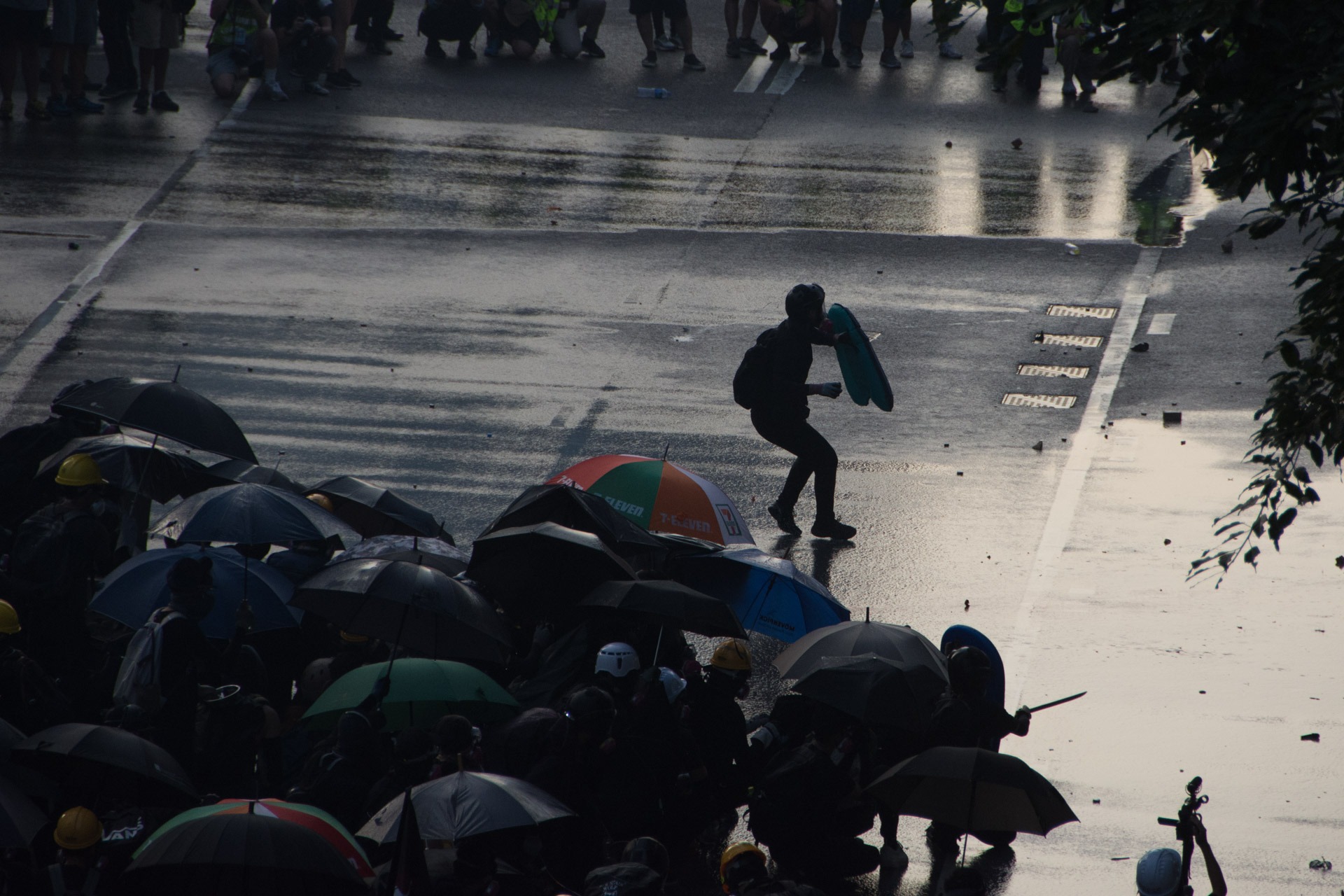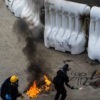Editor’s note: Promise Li’s critique of the right-wing turn in Hong Kong and the diaspora since the 2019 movement garnered a wide spectrum of opinions. In response, Lausan held a closed roundtable among several of its members to discuss points of contention and opinions related to the critique. The different positionalities that the panelists occupy—their respective social locations informed by their race, class, and gender—allowed them to reflect on the Hong Kong movement and Li’s critique from various angles. While based in the US, Samuel and Alex share close relationships with local Hong Kong activists. Also based in the US, Kate’s perspective is informed by her experience living in Hong Kong as someone from mainland China, and by her research on labor and politics. Yehua participated in labor organizing in London, and currently works in Hong Kong. As a diasporic Hongkonger in Canada, Vince works closely with other marginalized and racialized groups there to combat human rights violations, carceral politics, and racism through a transnational lens.
Using Li’s article as the springboard, the four panelists explored the different connotations of Hong Kong localism in a two-hour long conversation, reflecting on obstacles that challenge transnational solidarity between local Hongkongers and oppressed and racialized groups in the West. Under the unprecedented scale of government suppression in Hong Kong, we must continue to ponder and enact organizing strategies that can sustain both local and transnational anti-authoritarian struggles. This conversation prompts us to reflect critically on how we can more effectively cultivate and support a grassroots movement that does not only focus on a singular issue, but can connect marginalized people from different social locations to build power collectively.
The transcript of the roundtable has been edited and condensed for clarity.
Roundtable participants: Alex, Kate, Samuel, Vince, Yehua
Moderator: Shui-yin Sharon Yam
Shui-yin Sharon: Promise’s article critiques the right-wing turn in the Hong Kong pro-democracy movement. As a collective that focuses on cultivating transnational left solidarity, how can we effectively mount such critiques that could appeal to our diverse readership? From what positionality should we be engaging with tensions with local Hong Kong readers and audiences from outside of Hong Kong?
Samuel: Promise’s piece was great because he identified specific threats that are important. But there is a risk of homogenizing nativists or MAGA supporters in Hong Kong under one broad stroke. In terms of communication, the audience we are trying to critique may not believe that a piece like this is targeted to them. If they don’t see themselves in that critique, then the critique loses its force for them. We should start off by recognizing that in Hong Kong, it is possible for someone to see themselves as a localist but not a nativist, vice versa, or both. My contention is that all of these stances involve a coherent web of beliefs, including points we could criticize.
Part of what explains the support of some left-leaning Hongkongers for Trump is that there may be an inability to establish genuine links of solidarity with other people in other places on the ground. This is not a problem specific to Hong Kong, but there is a certain degree of difficulty in reaching out and understanding the sufferings of other people elsewhere. When we examine the ideological and structural contexts in Hong Kong, we must consider that this city has a strong neoliberal and conservative history that has shaped how we think through issues that may not always have to do with localism. However, the ongoing crisis in Hong Kong forced us to address and think through a myriad of social problems in the city, so I do see a progressive possibility in Hong Kong right now. But I think we have a long way to go.
Alex: Promise’s article is a great critique on the right-leaning phenomenon. But when I read the piece I struggled to think of an audience in Hong Kong that would resonate with this critique. Promise articulates what the problem is in Hong Kong, but it doesn’t seem to reach the intended audience. We need to think about how to frame this argument in a way that might be understandable to the intended audience.
When we are situated outside of Hong Kong, we also lack the immediate lived experience or the shared experience of folks in Hong Kong, and that creates a cognitive gap in trying to articulate how our concerns resonate with the worries and feelings experienced by Hong Kong people. I think that emotional connections are fundamental to political work. Recognizing that cognitive gap or that emotional gap is important, because it helps us rethink how we can deliver a more compelling argument or make sense to folks who are listening.
Engaging in coalition building
SYS: In order to engage Hong Kong readers in our critique of the movement’s right-wing tendency and its support for Trump, we cannot ignore the salient trauma-based narrative—namely, the argument that Hongkongers were traumatized and desperate under the government’s intense suppression, and hence some felt compelled to appeal to a strongman figure like Trump. How can we also acknowledge the colonial roots of trauma if we are to engage in decolonial work? What do we do in coalition building when we encounter this kind of sticky spot that has immense stakes for people across the political spectrum and positionalities? How do we navigate that?
Vince: Even in the context of Hong Kong, we need to discern whose trauma is being centered. This state capitalist authoritarianism and police as the the sharp end of the spear have been attacking the lower class, the working class, and migrants, for a long time now. Capitalism in Hong Kong is based on a racial economic caste system: where Southeast Asian domestic female migrants are at the base, where the Han middle class can get ahead. This type of oppression and the traumas that come from that, in my opinion, are not new. The question is, now that the state has started to target a much larger part of the population—and this is mentioned quite a bit in Promise’s piece too—then whose trauma is visualized, whose trauma is erased? These are factors we need to be thinking about when we envision political praxis.
As someone who has experienced direct threats based on my Chinese identity, I have a very visceral understanding of the consequences of Trumpism. Living in communities where this is an issue, you quickly understand the fear that Trumpism is causing and white supremacy is causing right in your community. It’s not moralism. But we have to understand and make room for the fact that sometimes these positionalities (between local and diaspora) will actually be different and vice versa. We have to understand those mutual triggers if we’re to communicate.
Ultimately, I think race is a discourse about power, which takes different forms in different places. Of course, if you say something is racist it will invoke an enormous visceral reaction. People have the point of not wanting to talk about it at all. It also does not always take the form of white supremacy. Otherwise, how can you understand the othering of the Uighur people in “Xinjiang.” This is a power issue—that is a discourse of justifying economic dispossession, but also creating a certain people as an ethnic threat.
Even in the context of Hong Kong, we need to discern whose trauma is being centered. This state capitalist authoritarianism and police as the the sharp end of the spear have been attacking the lower class, the working class, and migrants, for a long time now.
Kate: I completely agree with Vince’s point, that racism is not wedded to any one form of oppression, I’d compare it to gender dynamics. A more precise way to state my point is to say that racism is wedded to a lot of power dynamics and the power of equality. I suspect that a less morally charged way to criticize racism is to criticize the power dynamics behind it. Perhaps people would be more willing to accept that criticism and be more receptive, rather than a condemning, accusatory tone or branding as a racist.
S: I think there has always been a point of contention with how to go about recognizing a lot of different groups in the world right now, both geographically and ideologically. How do we manage to bring out that specificity but also transcend that specificity in talking about international coalition building?
We need to find projects that we can work on in a collaborative way if we really want a constructive dialogue. In my personal experiences, when I’ve attempted to collaborate with localists, oftentimes they are more open to changes, suggestions, and feedback than when we argue about the same topic in articles or in open forums. That collaborative relationship creates not only the trust needed for genuine persuasion but also the practical need for taking each other seriously, crucial elements absent in other discursive spaces.
A: It seems like we are each struggling with very different things at the same time. We invent new vocabularies, but we need to make sense of our critique to multiple audiences, we need to offer explanations, all while dealing with personal trauma or uncertainties. This is a project that requires patience because we lack the skills. As a Hongkonger myself, I would say that we need more patience. For folks who grew up in Hong Kong, there are very limited chances to be organized or socialized in a left-leaning circle. Those platform opportunities are less visible.
Yehua: Strategically speaking, I believe this critique is less helpful on a practical level in terms of finding common ground that you can build a base on. Even as we find many things that we want to create in the movement, and whether or not those reasons make us want to align less with it or align with it reluctantly, we have to find ways to engage with the people in the movement who are most mobilized in ways that are very different from how we’ve been doing it.
Suffering is universal but uneven on a global scale, and additionally, unique to each community. Rather than thinking about left and right in Hong Kong, it may be more constructive to think about how we lack conceptual tools to form a politics of difference. Iris Marion Young’s theory1 focuses on how to take different communities and different people’s aspirations for justice together, and to not have one group’s movements foreclose on another. There’s room for Hongkongers to learn how to do that. As of now, it’s a really under-explored path of not just our movement, but our observations around the world. I think that would be the most relevant and practical way to build the base for the progressive kind of liberation that we would like to see.
Interpretations of localism
A: I’ve also observed that a lot of people may be searching for ways to extend our reach to people from different political camps. However, this process is quite difficult because there’s a lot of trial and error. There are multiple localist camps and some belong to those out of realpolitik. There are also some localist folks who are open-minded but their starting point may not be from a left-leaning place; they might start from somewhere that understands “both sides.” The path they appeared to follow shared similarities to localists, but they also had a lot of the same concerns that left-leaning folks.
SYS: Localism has been a popular tenet for the Hong Kong movement. The term, however, carries different political connotations and values that are not always made clear. For instance, while some localists support nativist and xenophobic practices, others advocate for a more progressive approach2. What are your respective interpretations of localism?
Exclusionary localism may be described more as a symptom but not a root cause. I think we need to contextualize what localism means to Hong Kong’s politics because it may create a different political strategy. If localism is just a symptom, then we must ask ourselves, how can we identify the root cause of localism and articulate that discourse to make it visible to people? Recognizing that there are different interpretations of localism, but also opening up discussion and strategies on how to engage with these differences offers us a possible way forward.
Y: I think localism is a label that gets frequently tossed around when the people who identify as localists can be very different politically, and when we talk about there being a right-wing turn in the current movement. In my opinion, this characterization is completely false, but it is a symptom of the left trying to grasp what localism is. In the process of trying to understand what localism is, it interprets the right-wing elements and views it as a turn, as if there weren’t those tendencies in Hong Kong before.
I find it interesting that one of the first politicians in Hong Kong to have an openly localist platform enter an election is not far-right leaning. Eddie Hoi-Dick Chu, a progressive localist, has a platform about land justice, and advocates for self-determination situated in a very embodied and material way, rather than a more abstract and binary sense of democracy as being free from Chinese encroachment. Despite the fact that Eddie Chu has been politically active for quite some time, his type of localism is not dominant in Hong Kong but this also creates some worries for me. We need to do more than provide an alternative vision of what localism can be or what self-determination can be.
I believe that the idea of localism being a symptom and not a root cause is very useful for us to analyze as a kind of new identity politics or new turn in the Hong Kong movement. I think this is why when Hongkongers get labeled as right-wing or racists, they react so viscerally because it’s just so natural to them to act that way politically. Any labeling seems like not even an attack, but rather a complete misunderstanding of their lived experience.
Recognizing that there are different interpretations of localism, but also opening up discussion and strategies on how to engage with these differences offers us a possible way forward.
V: My interpretation stems from the five years I spent working as a staff lawyer at a Chinese and Southeast Asian legal clinic in Toronto. We provided different kinds of legal help—essentially poverty law—because we work with the low-income families from mainland China, anyone else who is Chinese-speaking, Vietnamese, Cambodian, Laotian, etc. This gave me a particular perspective on the CCP type of authoritarianism because many people came to the clinic as asylum claimants. We were also one of the main actors in pushing for and crafting a lot of the post-Tiananmen migrant, justice reforms, to allow a refugee path for various kinds of lifelines for Chinese international students—especially those who had been actively supporting the democratization movement in mainland China. So I have a natural, anti-localist sort of bent because of my subjectivity.
K: As someone from mainland China who was living in Hong Kong for education, I felt fearful at certain times. For example, I worried that if I spoke in Mandarin, I would reveal my mainland Chinese identity and there might be judgement. Whenever it was possible, I tried to speak English instead of Mandarin. I feel like I occupy an “in-between” space because I fully support the pro-democracy ideals that Hongkongers are fighting for, but I also understand why mainland Chinese people might be leery of the movement due to its nativist component.
The need for political education
SYS: A major challenge in cultivating transnational solidarity is that folks who do not share similar lived experiences often lack mutual understanding. For instance, as the ethnic majority, local Hongkongers may not understand the concerns voiced by diasporic Hongkongers who occupy a minoritized position in the West. It is difficult to build coalitions when people are seeing different realities, as Alex mentioned earlier. What suggestions do you have in overcoming these challenges? What kinds of political education is needed?
A: Hong Kong is a place that lacks intellectual infrastructure due to its historical contingency. After the Second World War, most of the Chinese intellectuals flocked to Taiwan. Peter E. Hamilton makes a very interesting point3 in saying that a lot of people from China moved to Hong Kong, while a lot of intellectuals and politicians moved to Taiwan. If the intellectuals in Hong Kong fled, how can we have an in-depth understanding of the complex situation in Hong Kong? I think as Vince and others point out, every community has their own trauma. We might just have to historicize trauma and explain it. That in itself needs more concrete understanding and research; perhaps that’s something scholarship can contribute to, but Hong Kong lacks the scholarly infrastructure.
K: I do think it is very important to offer political left-wing education. Although, I have some reservations about the left and right branding. The left-right branding is actually different from place to place. For example, in mainland China right now, if you’re a critic of what Xi is currently doing, many would criticize Xi as being a leftist. Being situated on the left is connected to authoritarianism, more state control, and/or more political movements like the Cultural Revolution.
Different ideologies are bound together in different things, according to and based on people’s memories, and on people’s lived experiences. So I don’t think branding itself is that important, but I do think a left-wing critic, no matter how we will brand the criticism or how we will brand the phenomenon that we’re critiquing, that left wing criticism itself is the thing we should put out there, regardless of the name people would like to call it.
People’s political stances are actually very fluid. Things that resonate with people change from time to time. With that, I think we need to try to deliver our message in ways that resonate with people. Political allies and enemies change according to circumstances. This is why I believe that labels are not very effective.
I agree with Alex’s point that a lot of things people are seeing comes from a lack of lived experiences. I think we can help fill those gaps using political education by creating analogies or breaking down concepts to explain other issues. For example, when I explained Black Lives Matter movement to my mother, who lacks any lived experience with the racial dynamics in the United States, I needed to use analogies she would understand.
V: So much of the Hong Kong movement, arguably including a lot of the liberals, lies within unidentified and undealt with proximity to whiteness and the legacy of colonialism. If those issues are not dealt with, it could possibly lead to what Promise has written about. Political education is really important. When you’re trying to work toward international solidarity you need to be cognizant of how the world perceives you on the left-right spectrum. So that’s where I think basic political education is needed, but we also need to examine what the fault lines between the left and right are when you expand outside Hong Kong.
It’s helpful to draw a line and say overseas Chinese political dynamics will be different from local Hong Kong because a scattering of people will have massively different dynamics. In a mass movement, we need to be thinking about what is the role or function or the positionality of the overseas political actors, as compared to the localized portion of it. I think it’s helpful that we have people who are much closer to those on the ground, who can help us do political education and translate those ideas in a way that will not turn people off.
Y: We all come from so many different contexts and backgrounds, so it takes time to communicate with one another. So for any group that communicates less frequently and are more politically disparate, it’s going to be very difficult to have much in common. Every movement is different and people should be allowed to articulate politics using terms that are most relevant to them. In one sense, it is everybody else’s duty to try to understand those terms, but at the same time it is also the duty of the people in the movement to explain them and educate others about it in a way that other folks can understand—we need to meet each other halfway.
Footnotes
- Young, I.M., & Allen, D.S. Justice and the Politics of Difference. Princeton: Princeton University Press. 2011.
- Yun-chung Chen & Mirana M. Szeto. The forgotten road of progressive localism: New Preservation Movement in Hong Kong, Inter-Asia Cultural Studies. 2015.
- Hamilton, Peter E. Made in Hong Kong: Transpacific Networks and a New History of Globalization. Columbia University Press, 2021.






